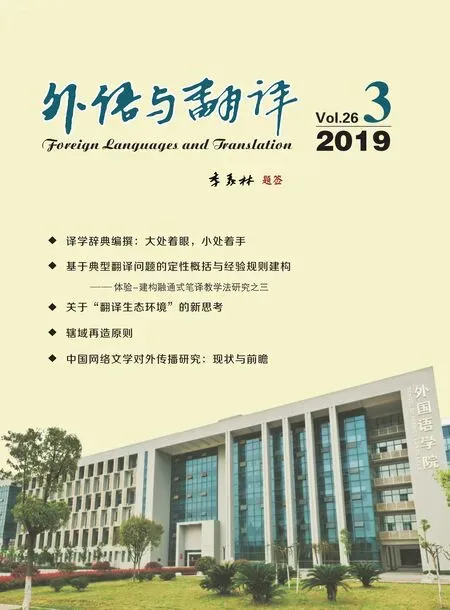Abstract of Major Papers in This Issue
On compilation of A Dictionary of Translatology (Fang Mengzhi & Xiang Cheng, p1)
From perspectives of compilation of A Dictionary of Translatology published by the Commercial Press in 2019, the paper takes some new terms including in it as examples to show the trend of translation studies for the last decade. Based on statistics the new terms are mainly contained in the following five fields: modern translation theories, translation services,interpreting research, translation teaching and translation technology. This paper also describes the compilation methods:textual research, carding, revision,and renewing entries.
On qualitative generalization of typical translation problems and formulation of empirical rules: A series of studies of a model integrating the notions of Embodiement and Constructivism for teaching translation (3) (Zeng Lisha,p13)
It is held that the innovative reform of teaching translation is to focus on instructing the students how to conduct inductive formulation of empirical rules based on the solutions to significantly difficult problems in translation, and enhancing their empirical rationality of extending inferences from one instance to other cases and comprehension by analogy.Based on the theoretical methodology of a model integrating the notions of embodiment and constructivism for teaching translation, the paper, through analyzing a couple of typical translation problems in comprehension and expression, illustrates the ways of fostering students' abilities of qualitative generalization, identification of contextual parameters, application of multi-methods, discrimination of empirical logic and formulation of empirical rules, which explores a high-efficient teaching model for enhancing the comprehensive accomplishments of translation talents.
Rethinking "Ecological Environment of Translation"(Jiang Xiaohua,p19)
"Eco-" comes from Old Greek, meaning "house" or "our environment". In 1869 Germane biologist Ernst Haeckel put forward the concept "ecology". Scientifically, "eco-" means the living conditions of living things in a certain area, and the balanced harmonious relationship among the living things or between the living things and the environment. But, in Humanistic studies "eco-" is a metaphor, meaning "good, healthy, harmonious". Thus, in eco-translatology, "eco-" is also a metaphor, it also means "good, healthy, and harmonious". Therefore, "ecological environment of translation" refers to an ideal environment in which the translator, translational act and the result of translation etc. exist. This paper, based on the rationale of Hu Gengshen's eco-translatology, further explains the nature, characteristics, connotations of "ecological environment of translation". It also explores, from the perspective of ecological ethics, the role a translator should play in an"Ecological Environment of Translation".
The Principle of Scope Reconstruction (Yang Yongzhong,p63)
Scope reconstruction is an important concept in syntactic research. Based on a summary of the syntactic distribution and features of scope reconstruction, the paper proposes the principle of scope reconstruction, including the licensing conditions and constraints on scope reconstruction. It is argued that scope reconstruction is the requirement of semantic interpretation and syntactic testing. Whether a constituent can be reconstructed depends upon such factors as prominence,syntactic hierarchy, zone, and c-command, and hence scope reconstruction is subject to Prominence Constraint and Locality Constraint.
Status quo and prospect of domestic studies on the international communications of Chinese Network Literature(Shan Yu & Cai Wanshuang,p69)
Network Literature is a rising star of Chinese culture going out. This paper analyzes the research on the external communication of domestic Network Literature, and makes a prospect for the future research. The results show that: the related research is increasing, but the overall quantity is limited, which still need the academic circle to pay more attention;The research focus involves communication content, communication media, communicator, audience, communication effect,communication situation and communication purpose, but it is still fragmented and has not formed an independent theoretical framework. Research methods tend to be diversified, but most of them are comments and tend to be casual, and a mature research method system has not been formed yet. In view of this, this paper looks forward to the future research from the following aspects: academic atmosphere construction, interdisciplinary theory integration and research method innovation.

